高考英语应用文作文模板
高中英语应用文作文模板
在这类题型中,同学们会读到一个特定的场景,然后在理解的基础上,给相关人士写一封短信,并在信中明确表达自己写信的原因、动机、目的和愿望等。文章所涉及的内容多种多样,但大部分都与日常生活比较贴近。书信的类型可能千变万化,如建议信、邀请信、申请信、求职信、感谢信、道歉信、批评信、抱怨信等(以建议信、邀请信和感谢信为主),然而万变不离其宗,只要掌握了英语书信的基本格式,参照作文模板并运用恰当的词句,就能写出一篇好的应用文。
1、建议信模板
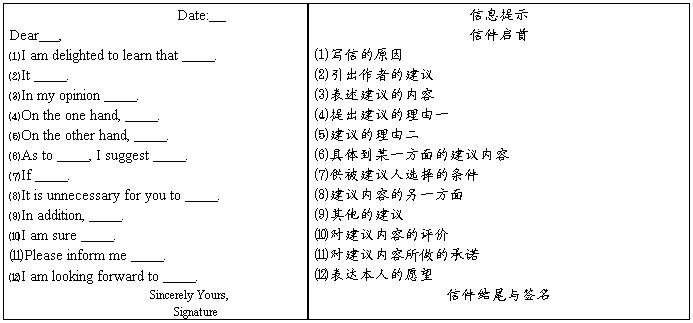
2、批评、抱怨、投诉信模板
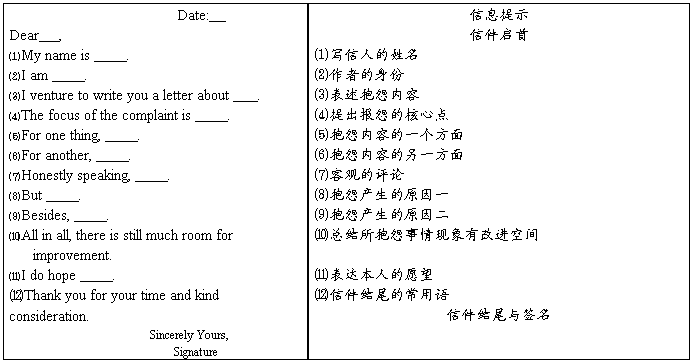
3、道歉信模板
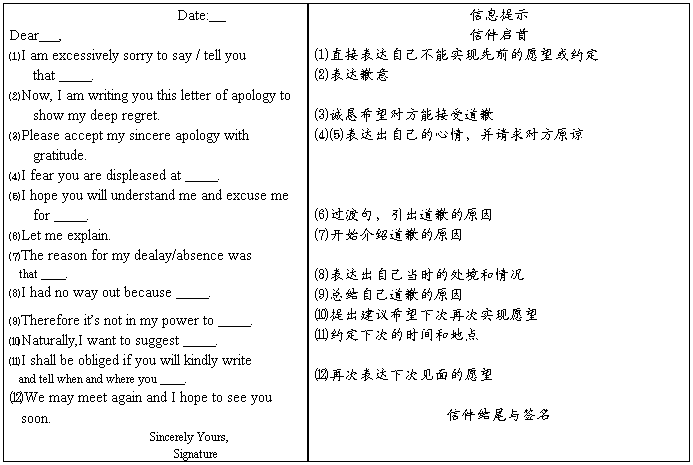
4、感谢信模板
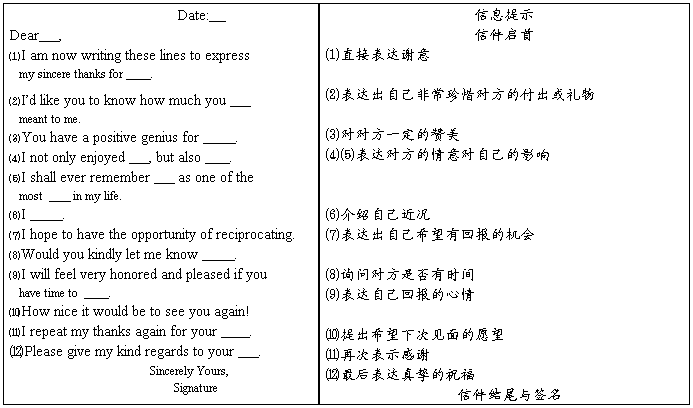
5、求职信模板
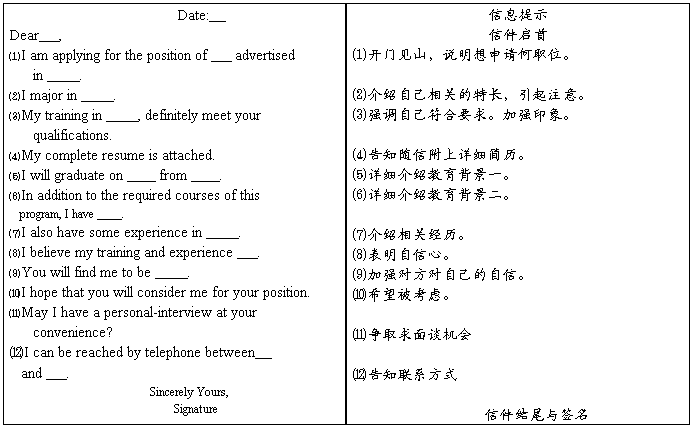
6、祝贺信模板
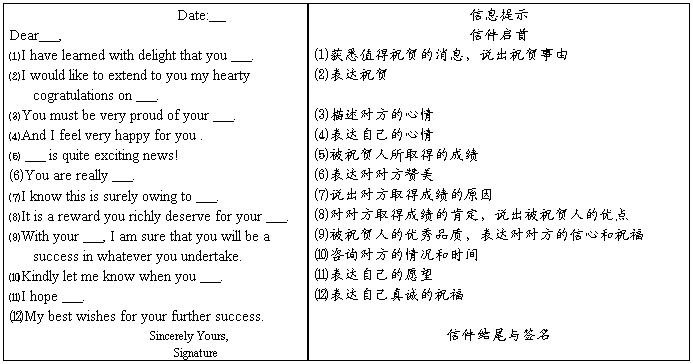
7、邀请信模板
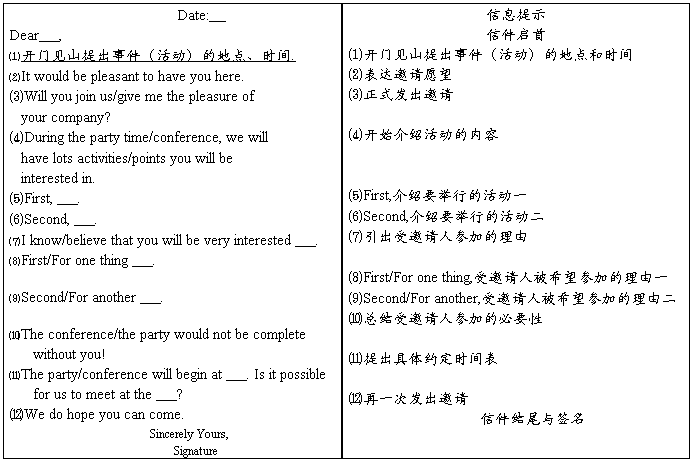
8、日程安排解说词模板

第二篇:20xx+高考英语实用短语
高考英语实用短语
1. a few + 名词(可数) 一些
a good few = quite a few = a great many 相当多
e.g. : (1). A few students are playing football in the playground.
(2). A good few / Quite a few of them are busy doing their homework.
2. a great deal of + 不可数名词 大量的,很多的
a great deal + 比较级,表示程度
e.g. : (1). Our country has a great deal of coal, oil and natural gas.
(2). He is a great deal taller than I.
3. a great many = a good many + 可数名词 许多,非常多
e.g. : a good many books / a great many people
4. a handful + 可数/不可数名词 少量的;一把;很少的
e.g. : (1)a handful of rice (一把米) (2)a handful of people (少数人)
(3)when the employer arrived, the secretary handed him a handful of letters. (一叠信)
5. a little + 不可数名词, “一点儿,有点儿”用于陈述句中,表示肯定.
little “几乎没有, 很少”,表示否定.
e.g. : A: would you give a little more attention to your pronunciation?
B: I’m sorry, Miss Zhang. I paid little attention to it.
6. a lot of / lots of + 不可数名词或复数名词, “许多的,大量的”,通常用在肯定句中.
e.g. : Every year , a lot of outstanding students in our school are admitted to many key universities.
7. a large number of + 可数名词 “许多”
e.g. : A great number of students graduate from our school every year.
8. a large amount of + 不可数名词 “许多,大量”
e.g. : A large amount of money was needed for the project.
Large amounts of + 不可数名词, 但谓语动词用复数
e.g. : Large amounts of time have been spent doing our boring homework.
9. a large quantity of / large quantities of + 不可数或复数名词 “大量,许多”
e.g. : (!) We have had quantities of rain this year.
(2) He buys things in large quantities.
10. plenty of + 不可数名词或可数名词复数 “许多; 充裕”
e.g. : (!) There is plenty of time left for us to relax ourselves.
(2) There are plenty of eggs in this house.
11. above all = the most important of all 首先, 首要
e.g. : (1) As a human being, we must find something to do, above all, we must believe in ourselves.
(2) We must learn to enjoy life and above all, we must value time.
12. according to + 名词,代词,或由what引导的名词从句 , “ 根据,按照…”
e.g. : (1) According to the law, he will be sentenced to death.
(2) According to what the teacher has said, there will be a meeting tomorrow.
13. be about to do = be on the point of doing sty “即将,将要”
e.g. : (1) We were about to start when it rained.
(2) We were on the point of giving up when the captain took charge and encouraged us to save the
sinking ship.
14. be absent from … “缺席”
e.g. : (1) He was absent from the meeting today.= He absented himself from the meeting today.
(2) Who is absent from school today?
15. be accepted as “被承认,被认可是…”
e.g. : (1) He is accepted as one of the top students in our school.
(2) Charlie Chaplin was accepted as one of the greatest film actors and directors.
16. achieve one’s goal 达到目标
achieve great success 取得成功
make great achievement 取得成就
e.g. : (1) He will never achieve your goal if he doesn’t work harder.
(2) He made great achievements in science.
17. act as 担当,充当
act on 对…有效; 按… 行事
act out 表演出
e.g.: (1) a trained dog can act as a guide to a blind man.
(2) The medicine doesn’t act on me.
(3) They made up a short play and act it out. In the play he acted as a young pioneer.
18. add … to… 把…加到…上
e.g.: (1) if you add 5 to 4, you get 9.
(2) 5 added to 4 are 9.
19. add to 增加
e.g.: (1) Fireworks(烟火) added to the attraction of the festival night.
(2) His illness added to the burden of his family.
add … up 把…加起来
add up to 总计是; 意味着
e.g.: (1) add up the figures, and you will get the total.
(2) His whole school education added up to no more than one year.
(3) Running faster, being stronger and having good techniques don’t add up to victory in sports.
20. in addition (to) 另外;除…之外
e.g.: (1) He speaks French in addition to English.
(2) There was an earthquake and, in addition, there were floods.
21. give advice on sth 提出意见(忠告)
follow / take / carry out sb’s advice 遵从(接受,执行)某人的意见
e.g.: At the very beginning of this term, our English teacher gave us some advice on how to learn
English well and asked us to follow it.
22. advise sb. to do sth 劝说某人干某事
advise doing sty = suggest doing sty 建议干某事 advise sb’s doing sty
e.g: (1) I advised him to give up smoking.= I advised his giving up smoking.
(2) The teacher advised giving students more free time for them to do what they like.
23. be afraid of (doing) sth. 担心会… ; 对…有顾虑
be afraid to do =don’t dare to do 不敢干某事
e.g: (1) Afraid of being late for school, he hurried up.
(2) She was afraid to get close to the tiger in case he should be killed.
24. after all 毕竟;终究 .置于句末表示结果与预想有所不同;置于句首,用于导出原因,表示强调的语气. e.g: (1) Though the maths problem was difficult, he worked it out after all.
(2) Don’t scold him too much. After all, he is still a child.
25.again and again=time and time again ,再三地,反复地
e.g: A: I have told them again and again not to be so noisy, but they didn’t listen to me.
B: Yes, and I have told them many times too. The result is the same.
26. be against 反对 be for 赞成
e.g: (1) Are you for or against the plan?
(2) We are strongly against taking drugs.
27. agree with 适宜;与……相宜
e.g (1) What he did doesn't agree with what he said .
(2) The weather here doesn’t agree with me.
28. agree to = say “yes” to 同意 “提议,计划, 方案,打算,主意”
agree with = have a similar opinion with sb. 与…意见一致,同意某人的见解(意见,观点)
agree on 关于…达成一致意见,一致同意
e.g.: (1) He agreed with my idea / opinion / view / me / my words / what I said.
(2) We agreed on the plan / on the price.
(3) He agreed to my suggestion / proposal / decision / my going there / my act / what I said.
29. agree to do 同意于
e.g.: He agreed to help me. 不能说 agree sb to do
30. in agreement with 与…一致, 与…符合
reach / come to an agreement with sb. 与…达成协议
e.g.: He is in agreement with me about how to settle the problem.
31. ahead of = in advance of = better than 在…前面; 优于; 胜过
e.g.: (1) He fulfilled the plan ahead of time.
(2) He is far in advance of others.
32. aim to do sth = aim at doing sth 致力于
e.g.: (1) I aim to be a writer.
(2) The Hope Project, aiming at helping the poor children, has been performed for many years.
33. in the air 在空中,悬而未决
on / off the air 正在广播(停播)
e.g.: (1) Our problem are still in the air.
(2) The Olympic Games are on the air now.
34. air one’s views 发表观点
e.g.: We are free to air our views at the class meeting.
35. put on airs 装模做样
e.g.: He is so vain (虚荣的) and proud that he is always putting on airs.
36. by accident = by chance 偶然的
on purpose = by design 故意的
e.g.: (1) I met him in the street by accident.
(2) Did you do it on purpose or by chance?
37. as a matter of fact = in actual fact = in fact = actually 实际上,事实上
e.g.: As a matter of fact, he doesn’t anything about this thing.
38. apart from = besides 除去; 除 … 之外(包含在内的)
e.g.: A: What subjects do you study besides English and Chinese in senior?
B: We study maths, politics and history apart from the two subjects.
39. admit (to) sth / doing sth 承认,招认
e.g.: (1) He admitted having stolen the car.
(2) He refused to admit to being wrong / his mistakes.
40. be admitted to 被录取到 admission n. 录取
e.g.: (1) He was admitted to Being University.
(2) Every year about 600 students are admitted to our school.
(3) Admission to university depends on the results of the college entrance examination.
41. in advance 提前,事先
e.g.: You should get everything ready for the trip in advance.
42. leave sth / sb alone 不去理会;不用去管
e.g.: He is upset now. Leave him alone.
43. let alone 更不用说
e.g.: (1) He can’t speak English, let alone write it.
(2) He has never heard of the name of Beethoven, let alone his music.
44. get along with… 进展; 相处
e.g.: (1) How are you getting along these days?(你的近况如何?)
(2) He is easy to get along with.
(3) He gets along well with all his classmates.
45. be angry at (about ) sth 因…而生气
be angry with sb 对…人生气
e.g.: (1) He is bad-tempered (坏脾气) and he is always angry at some odd thing.
(2) Don’t make the same mistakes again or your teacher will be angry with you.
46. announce sth to sb = announce to sb sth 通知; 宣布
e.g.: The government announced to the public that they would pay their debts.
Make an announcement 发布通知
e.g.: Boys and girls, may I have your attention please. I have an announcement to make.
47. answer for 对…负责; 受惩罚; 得到报应
e.g.: (1) As a real man, you should answer for what you have said and done.
(2) All these wrongs are to be answered for.
(3) You’ll answer for the wrongs you have done to me.
48. be anxious for ( about )… = be worried about… 为…担心…
e.g.: (1) He was anxious for the safety of his money.
be anxious for sth = be eager for… 对…渴望
e.g.: As human beings, we are anxious for success.
49. apologize to sb for sth = make an apology to sb for sth 为某事向某人道歉
e.g.: (1) I apologized to her for stepping on her foot.
(2) He was late for school, so he made an apology to his teacher for being late.
50. as well 也; 还; 同样
might / may as well do sth 不妨; 还是……好
may well do sth 有充分的理由可以
e.g.: (1) If he goes to Beidaihe, I will go as well.
(2) There is nothing to do, so I may as well go to bed.
(3) As you are busy preparing for the final exam, you may well refuse his invitation to the cinema.
51. as well as 即…, 又…, 连接两个并列成分,但不能连接句子
e.g.: (1) I as well as my parents am going to see my sister off at the airport.
(2) He enjoyed the beautiful sights as well as the delicious seafood.
52. appreciate sth / doing sth 欣赏;感谢
e.g.: (1) I shall appreciate hearing from you again.
(2) We appreciate your help.
53. argue with sb about / over sth 争辩
argue sb into / out of doing sth 说服…做 / 不做某事
e.g.: (1) The couple are arguing about money matter.
(2) They tried to argue him into joining them.
(3) His father used to be a heavy smoker. He argued his father out of smoking two years ago.
54.around the corner = draw near 在附近; 临近
e.g.: (1) There is a shop around the corner.
(2) The final examination is around the corner.
55. as … as…
e.g.: as firm as rock 坚如磐石 as easy as ABC 极容易、
as busy as a bee 极忙碌 as white as snow 雪白
as strong as a horse 壮如牛
56. as … as possible = as … as sb can 尽量; 尽可能
e.g.: He ran as fast as possible. = He ran as fast as he can.
57. attend to == give care and thought to 留心; 注意
e.g.: Please attend to your work / what the teacher is saying.
attend (on / upon ) sb == wait on; serve; look after sb 服侍
e.g.: She has many servants attending on her.
58. pay / give attention to 注意 …
e.g.: (1) Much attention must be paid to your handwriting.
(2) The attention that you paid to your handwriting is far from enough.
59. fix one’s attention on (upon) sth 集中注意力在…
e.g.: (1) He sat there, with his attention fixed on what the teacher said.
fix one’s eyes on 盯着… 看
e.g.: He sat with his eyes fixed on the blackboard.
60. on ( an / the ) average 平均而言
e.g.: (1) On average, one out of five students can be admitted to university.
(2) On average, American kids aged 3 to 12 spent 29 hours a week in school.
61. at table 在吃饭、 at work 在工作 at play 在玩耍
at sea 在航海 at leisure 在休闲
62. at once = in no time = right away 立刻;马上
all at once = all of a sudden 突然;忽然
e.g.: A fire broke out all at once at a room. Tom call people at once.
63. at sb’s expense == at the expense of sb 由 … 出钱; 以 … 为代价
e.g.: (1) He went abroad at his own expense.
(2) I visited Beijing at the expense of my company.
(3) He built up his business at the expense of his health.
64. at ( the ) most = not more than 最多
at ( the) least = no less than 至少
e.g.: The necklace is worth 800 dollars at the most. = The necklace is worth not more than 800 dollars.
65. (a) waste of time / money 浪费时间 / 金钱
e.g.: (1) It is a waste of time to stay indoors with such a nice day.
(2) Playing games all day long is really a waste of time and money.
66. be busy doing sth
be busy with / at / over / about sth 忙于做某事
be kept busy doing sth 被迫…为忙碌
e.g.: (1) A: What are you doing recently?
B: I kept busy preparing my final exam.
(2) The teachers keep the students busy doing their homework.
67. be familiar with sth 熟悉; 通晓
be familiar to sb 为……所熟悉的
e.g.: A: Are you familiar with Li Lei?
B: The name is familiar to me, but I can’t remember clearly.
68. be famous for 以……著称; 以……闻名
be famous as 作为……著名; 作为……而闻名
e.g.: GuiLin is famous as a place of interest and it is famous for its beautiful mountains and waters.
69. be fond of 喜欢; 喜好 ( 表示习惯性的喜欢,爱好,因此不与具体的时间状语连用 )
e.g.: I am fond of classical music.
70. be in love with 与……恋爱; 在恋爱 (状态)
fall in love with 与……恋爱; 爱上….. (动作)
e.g.: They fell in love with each other at first sight and now they have been in love for a year.
71. be proud of = take pride in 为……而自豪; 以……为荣
e.g.: (1) I am proud of being a Chinese.
(2) I took great pride in being a student of NO One middle school.
72. be made up of = consist of 由……组成
be made of 用……制成( 可以看出原材料)
be made from 用……制成( 看不出原材料 )
e.g.: (1) My class is made up of 100 members. It’s really a big union.
(2) The desk is made up of a surface and four legs. It’s mad of wood.
(3) As we all know, wine is made from crops.
73. turn one’s back on 避开; 不理睬
e.g.: (1) I can’t turn my back on him when he needs help.
(2) He turned his back on his rich family and joined he red army.
74. go bad 变质( 坏)
go wrong 出毛病
go mad / crazy 发疯
e.g.: (1) The food doesn’t keep long and it goes bad easily.
(2) Something has gone wrong with the machine.
(3) Children go crazy about computer games.
75. be bathed in 笼罩; 沐浴在…
e.g.: (1) The whole school is bathed in the sunlight.
(2) All the city was bathed in a festival atmosphere in the Spring festival. (沉浸在节日气氛中)
76. come into being 形成; 产生
e.g.: (1) Before the railway came into being, a four- house coach was a popular means of transportation.
(2) There are different stories as to (关于) how the LeiFeng Tower came into being.
77. believe in 信任; 信仰; 认为…有价值
e.g.: (1) The manager believes in him.
(2) They believe in God.
(3) He believes in morning exercise.
78. believe it or not 信不信由你
e.g.: (1) Believe it or not, he was charged (指控) with theft (偷盗).
(2) Believe it or not, both teachers and students are suffering from lack of free time.
79. belong to 属于
e.g.: (1) China is a developing country belonging to the third world.
(2) Put the book where it belongs.
80. not a / one bit = not at all 一点也不
not a little = very much 非常
e.g.: (1) I’m not a / one bit tired now.
(2) I’m not a little tired.
-
英语写作范文之应用文的常用句型
英语写作范文之应用文的常用句型一邀请信1Iquotdliketocometodinner非常希望共进晚餐2requestthepl…
-
中考英语应用文写作范文
中考英语应用文写作一电子邮件假设你是LiuMing下面是你的笔友ZhangPing给你发来的email请你也用email给Zhan…
-
英语作文--常见英语应用文格式分析和样本(作文范例)
一英文书信通常包括6个组成部分信头heading包括寄信人地址和日期信内地址insideaddress指收信人地址称呼saluta…
-
英语应用文写作范文
英语应用文写作范文1外籍教师Lynne任教期满准备回国学校答应派车送她去机场她在临行前一天写了张便条提醒办公室李老师1请检查che…
-
英语应用文写作范文精选
应用文写作范文精选感谢信范文:ToWhomItMayConcern,Asastudentofthisuniversity,Iwou…
-
最新高考英语应用文写作范文精选
最新高考英语应用文写作范文精选1外籍教师Lynne任教期满准备回国学校答应派车送她去机场她在临行前一天写了张便条提醒办公室李老师1…
-
最新高考英语应用文写作范文精选
最新高考英语应用文写作范文精选1外籍教师Lynne任教期满准备回国学校答应派车送她去机场她在临行前一天写了张便条提醒办公室李老师1…
-
高中英语经典作文范文手册集:启事(应用文)
高中英语经典作文范文手册集启事应用文优秀范文Found招领启事OntheafternoonofApril7thIfoundabla…
-
高中英语经典作文范文手册集:广告(应用文)
高中英语经典作文范文手册集广告应用文优秀范文BUSINESSSERVICES待聘广告TUTORINGMathsPhysicsand…
- 系统英语_高考英语应用文作文模板